Flesh Welder / Ronald Kelly
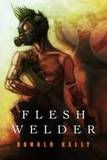 Croatoan Publishing / April 2008
Croatoan Publishing / April 2008
Reviewed by: Shannon Riley
War has made Ruin Town, a small settlement near Houston, Texas, living hell for those unlucky enough to be trapped between the two opposing factions. The story is futuristic; set in 2017 in desperate and ravaged region. The military leader, General Jeremiah Payne, is a sadistic butcher who preys upon the innocents who manage to survive the bombs and fighting. Mutilation, murder and rape are all sport to him and his band of mercenaries. The only hope the people have is one man, a doctor known as the Flesh-Welder.
“Flesh Welder,” a story that originally appeared in Noctulpa: Journal of Horror #4 (1990), is now a new chapbook from Croatoan Publishing, and it marks the return of popular Southern horror author Ronald Kelly after a ten-year hiatus.
The strength of Flesh Welder lies in Kelly’s unique writing style that he calls “southern-fried horror,” one that explores the dark side of Dixie, and his characters and dialogue reinforce a sense of authenticity to the tale. There is a delicious sense of mystery at play here, and the suspense in the story builds through anticipation of what the unexpected horror is and when it will be revealed.
The cover design and artwork for this attractive publication is by artist Zack McCain, and the chapbook includes - in addition to the title story - an exclusive interview with the author conducted by Mark Hickerson, plus a two-chapter excerpt from Kelly’s upcoming novel, Undertaker’s Moon, a re-release from Croatoan of his novel Moon of the Werewolf. The chapbook is signed by both author and artist.
Kelly is the author of eight novels published under the Zebra imprint in the late 80’s and early 90’s, including Hindsight, Moon of the Werewolf and Blood Kin. His audio short story collection, Dark Dixie: Tales of Southern Horror, from Spine-Tingling Press was nominated for a Grammy Award in 1992.
Flesh Welder is an exciting comeback story that should please existing Ronald Kelly fans and introduce his work to many new ones.
Purchase Ronald Kelly’s Flesh Welder.
Old Flames / Jack Ketchum
 Leisure / May 2008
Leisure / May 2008
Reviewed by: Shannon Riley
No monster is more devious or dangerous than the human monster, a fact author Jack Ketchum uses to good advantage in fiction that explores the dark side of the human psyche. His latest offering, Old Flames, is no exception. The book includes two long novellas, “Old Flames,” published here for the first time, and “Right to Life,” a horrifying tale of sexual depravity and murder that gives a completely new meaning to the phrase.
Ketchum pulls no punches. His fiction is gripping, chilling, edgy, and he never shies away from the controversial issues that have endeared him to countless readers. The works contained in this new volume are no exception.
We have all seen them advertised on the internet - companies offering their services for locating former classmates. “Old Flames” is the story of Dora Wells, a woman who, disappointed by her unfulfilling relationships with men, uses just such an agency when she goes searching for her high school sweetheart. She believes the reunion with Jim Weybourne will rekindle the perfect love that might have been.
When Jim is found, Dora wastes no time in going after him, disregarding the fact that he now has a wife and children.
Her efforts to win him back are calculated and chilling, and the story quickly escalates to become not so much about a woman seeking to recapture lost love but an account of the demented lengths that Dora, who is incapable of real love, goes to in order to gain what she wants.
“Right to Life” is at times reminiscent of Ketchum’s masterpiece The Girl Next Door. A couple loosely involved with abortion protesters kidnaps a woman at a clinic and holds her hostage under the pretence of saving her unborn child. Subjected to humiliation, sexual perversion and torture, she at last becomes aware of her captors’ ultimate goal.
Jack Ketchum is a multiple Bram Stoker Award winner and author of twelve novels and several short story collections. His short story collection Closing Time and Other Stories received the Readers Choice Award for Best Dark Genre Collection from DSM in its first annual Black Quill Awards, and the screen adaptation of his novel Red won high honors at the 2008 Sundance Film Festival.
Ketchum’s stories are straightforward accounts of how common situations can take unexpected twists and turns that expose the inner darkness within his characters. Old Flames is a double barrel shot of terror that strikes right on target.
Purchase Jack Ketchum’s Old Flames.
Judas Horse / April Smith
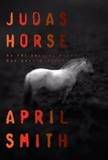 Alfred A. Knopf / February 2008
Alfred A. Knopf / February 2008
Reviewed by: Martel Sardina
Special Agent Ana Grey is back for her third adventure in April Smith’s Judas Horse. Writing series mysteries requires the author to perform a juggling act. Each book in the series should stand on its own. Authors must provide enough backstory to give new readers context without going overboard on the details and boring those who have followed the series since its inception. In this case, April Smith succeeds on both counts.
Ana’s return to duty after a justified shooting incident leaves her reeling when she learns that a fellow agent has been murdered. The group responsible, FAN (Free Animals Now), are hard-core anarchists, who use the cause of animal rights as a cover for their acts of domestic terrorism. Ana must go undercover to infiltrate this group and bring the murderers to justice.
After undergoing grueling training at the FBI’s undercover school, Ana emerges as Darcy DeGuzman, an animal lover who is determined to help save the wild mustangs of the West. Darcy heads to Oregon determined to work her way into the good graces of Julius Emerson Phelps, one of the leaders of FAN.
As Ana immerses herself and becomes a member of Julius’s “family,” she discovers that Julius is a master of deception. He harbors a grudge against the FBI after being wronged in the past and now possesses scandalous information that could rock the Bureau to its core.
The plight of the wild mustang is not just a fictional problem. In Smith’s acknowledgements, she notes that Judas Horse grew out of a research trip to Oregon. Observing the mustangs in the wild was a “life-changing experience.” Smith is now a member of Return to Freedom, a non-profit horse sanctuary that provides safe haven to nearly two hundred wild horses and burros.
Smith does an outstanding job of showing the reader what it is like for a deep-cover agent to assume another identity. The physical challenges Ana faces are nothing compared to the psychological battle she endures. With each day that passes, Ana loses a little bit more of herself to her alter ego. She is often left wondering whose side she should really be on.
With each turn of the page, Smith finds a way to raise the stakes for all of the parties involved. The result is a fast-paced thrill ride, brilliantly executed, which should please Smith’s previously established fan base and newcomers alike.
Purchase April Smith's Judas Horse.
Corpses So Lively / William A. Veselik
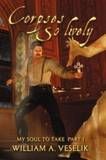 Mundania Press / October 2007
Mundania Press / October 2007
Reviewed by: Derek Clendening
Professor Alfred Rhys Smythe, the protagonist of William A. Veselik’s Corpses So Lively, returns to London after several years spent abroad. Upon his return home, he notes some changes to the neighborhood: namely, the theater district is now crawling with the walking undead! The mysterious death of a boarding house neighbor triggers this suspicion, and he soon realizes that bloodthirsty vampires are stalking London. As Smythe finds a telling infection in one of his student’s blood and the death toll continues to mount, the impact of the crimes strikes closer to home and he finds himself engaged in battle against vampires with a Scotland Yard sidekick. Corpses is the first book in Veselik's My Soul to Take trilogy. The Mundania Press trade paperback cleverly weaves vampire lore with a Sherlock Holmes-style mystery plot.
Veselik skillfully re-creates an authentic Victorian atmosphere by blending historical and cultural details that transport the reader back to a different time and place. His approach to the vampire as a creature is inventive as well, using hard science to explain the spread of vampirism in the city.
The most noteworthy aspect of the novel – one that will be received by readers as either a tickle of ingenuity or a smack of cliché - is its direct parallel to Dracula. It references Stoker's text - as many vampire novels do - only Veselik's direct comparisons are intentional. The time period is 1897, the year Bram Stoker’s Dracula was published, and Veselik uses Smythe’s familiarity with the creatures described in Stoker’s new literary work as a plot device. And while the opening chapter’s revelation that Smythe is a biology professor who is familiar with vampires certainly helps with the hard science aspect, it screams Van Helsing perhaps a bit too loudly at times. Occasionally, Veselik overshoots a bit, either not trusting the reader to understand facts that he has already established or weighing down the narrative in unnecessary detail.
Corpses So Lively ends with an excellent cliffhanger as any serialized novel should, and Veselik offers enough enticement to pick up the next installment, Enter Death, Stage Right. Though parts of this first volume rehash classic vampire works, it still offers some new insight into vampire lore, and a satisfying new twist for vampire fiction.
Purchase William A. Veselik’s Corpses Most Lively.
Dominion / Greg F. Gifune
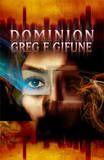 Delirium Books / March 2008
Delirium Books / March 2008
Reviewed by: Shannon Riley
The death of a loved one is never easy, and for Daniel Cicero, the sudden and violent accidental hit and run death of his beloved wife, Lindsey, is shattering. Trapped in a prison of unrelenting grief, unable to move forward with his life, he clings to the comfort of established routine, driving each day to the radio station from which he was fired, spending his nights in the company of his best friend or wandering the streets, living always in the shadow of his loss.
Then strange things began to happen. A stranger calls and taunts him with the message that Lindsey is still alive and he begins seeing private photographs of his wife as well as other disturbing images on the computer. As the malevolent stranger draws nearer, dreams and premonitions make it difficult to distinguish fact from illusion, and when Daniel goes in search of the truth, he finds himself confronting the possibility of alternate realities and evil that uses technology and our secret sins as bridges between worlds.
Delving deeply into the theory of quantum physics, the story presents the possibility of multiple physical manifestations of the same individuals existing, not in separate spheres, but here on earth at the same time.
Multi-layered and veined with subplots, the novel questions aspects of how society labels persons different than the norm and whether the accepted means of determining intelligence is actually a means of discrimination.
Greg F. Gifune has been called “the thinking person’s horror writer,” and he is that. He is also a master storyteller. Associate editor at Delirium Books, he is author of such novels as Deep Night, The Bleeding Season and A View from the Lake.
Compelling and beautifully written, Dominion is at once a disturbing story of loss, guilt, and the triumph of darkness as well as a dissertation on human existence that questions the very foundations of our beliefs about God, life and the hereafter.
Purchase Greg F. Gifune’s Dominion.
Twilight / William Gay
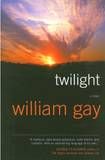 MacAdam Cage / September 2007
MacAdam Cage / September 2007
Reviewed by: Blu Gilliand
Twilight opens with Kenneth and Corrie Tyler, brother and sister, as they sneak through a cemetery after dark digging up graves. That the two turn out to be the heroes of William Gay’s Southern Gothic tour-de-force is a good sign that the story getting ready to unfold will keep the reader continuously off-balance.
The Tylers are engaging in their unsavory nighttime excursions in an effort to prove that local undertaker Fenton Breece has been engaging in some unsavory practices of his own. And while here’s plenty wrong in the graves they unearth, it’s a briefcase full of photos, fortuitously lifted from the trunk of Breece’s own car, which shows just how depraved the man has become.
When Breece is confronted with what the Tylers have, and what they plan to do with it, he turns to one Granville Sutter, a relentless, remorseless engine fueled by greed and hate. Sutter’s lunacy is legend in and around the town – a legend that the convicted murderer has no trouble living up to.
What follow is a manic road trip set against a twisted Southern landscape full of warped and eccentric characters. Tyler’s literal run through the jungle brings him in contact with an assortment of tough, proud and stubborn people, most of who are living off their wits and the land and little else. Unfortunately for them, wherever Tyler goes, Sutter is not far behind.
As the novel progresses, Granville Sutter becomes less a man and more a force of nature, a wildfire burning through every obstacle between him and his quarry. Sutter is Gay’s smart, literary take on the classic horror film slasher – he’s Michael Myers’ single-minded pursuit given motivation and a cold, calculating intelligence.
Gay’s influences resonate on every page, especially in the stark prose and aversion to quotation marks he shares with Cormac McCarthy. But where McCarthy sometimes provides simple sketches of characters on which readers hang their own impressions, Gay’s people are fully-drawn, well-rounded portraits of love, obsession and madness.
Twilight moves at a lightning-quick pace, but it’s a richly satisfying book. It’s a horror novel of the most terrifying kind, one that is entrenched in the real madness that hides behind the eyes and doors of people we see every day. Highly recommended.
Purchase William Gay’s Twilight.
Mad Dogs / Brian Hodge
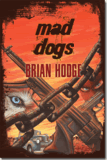 Cemetery Dance Publications / October 2007
Cemetery Dance Publications / October 2007
Reviewed by: Martel Sardina
Getting married is dangerous business, especially for actor Jamey Shepard. Jamey’s road trip from LA to Phoenix, where his impending nuptials are to occur, should be nothing more than a relaxing, leisurely drive. Instead, a stop for gas turns deadly when an overzealous cop mistakes Jamey for Duncan MacGregor, the real-life criminal Jamey portrayed on a recent episode of the TV crime series American Fugitives.
Jamey flees the scene and contacts his agent, Sherry Van Horn. He plans to turn himself in but wants to have a lawyer before he does, because if the other cops are anything like the one he just encountered, he’ll be surrendering to a lynch mob. Sherry assures Jamey that she will retain a lawyer to help him clear up this mess. All Jamey has to do now is go to the nearest police station and end this nightmare. With any luck, he can still be reunited with his fiancée, Samantha, in time for their wedding.
Unfortunately, the only luck Jamey finds from this point on is bad luck. Two amateur bounty hunters find Jamey before he can turn himself in and are trying to figure out how to best profit from his capture.
Now that Jamey’s life is starting to look more and more like Duncan MacGregor’s, a phenomenon is occurring back in Hollywood. There is an inverse relationship between Jamey’s misfortune and the amount of money people are willing to pay to for the rights to his story. Jamey’s newfound infamy leaves one question unanswered: will Jamey be able to stay alive long enough to cash in?
Hodge takes the reader on a roller coaster ride, navigating the twists and turns through both Jamey’s eyes and the enriched point of view of the supporting characters. The seamless transitions captivate the reader and keep the story moving forward at a steady pace. Even when Jamey has a moment to catch his breath, Hodge never gives the reader the opportunity to lose interest. Hodge leaves each scene and each chapter with unanswered questions and promises yet to be fulfilled. By the novel’s end, Hodge delivers the answers and a satisfying resolution. Hodge also manages the hard task (in a work of this length) of neatly tying up all of the loose ends.
These days, crime novels that top the 300-page mark are becoming a rarity. The mainstream publishing houses are unwilling to take risks on epic novels. Fortunately for readers, Cemetery Dance had the foresight to take a chance on Hodge’s latest gem. Readers who invest the time in reading Mad Dogs will not leave their reading chairs disappointed.
Purchase Brian Hodge’s Mad Dogs.




